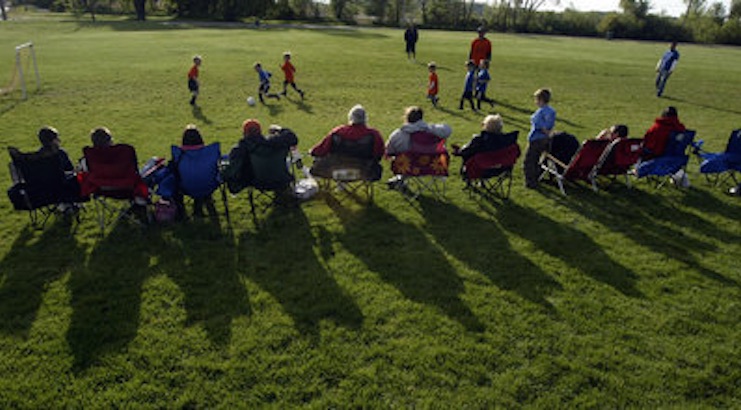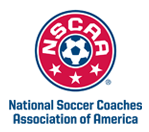PCA’s Jason Pratt on Controlling Your Youth Soccer Sideline … The One With The Parents On It
Jason Pratt is a former Director of Coaching and former Director of Training with Boyertown Soccer Club and currently a Partnership Manager for the Northeast for Positive Coaching Alliance (PCA). Pratt has also worked with Paul Riley’s Women’s Professional Supergroup as Director of Operations. In his role with PCA, Pratt is responsible for working with youth sports organizations in New York, New Jersey, Pennsylvania and Delaware. He also helped to establish PCA’s partnership with the National Soccer Coaches Association of America (NSCAA).
 America’s soccer sideline is clearly out of control. Parents show up to cheer for their kids and often become too belligerent while watching a youth soccer match. Spectators who should be definition be watching are quick respond to any conflict with increasing angst. Often, youth soccer players are embarrassed and sometimes even other parents become mortified. Why is our soccer culture igniting on the sideline? What can we do about it? Here are the sane thoughts of a smart human being.
America’s soccer sideline is clearly out of control. Parents show up to cheer for their kids and often become too belligerent while watching a youth soccer match. Spectators who should be definition be watching are quick respond to any conflict with increasing angst. Often, youth soccer players are embarrassed and sometimes even other parents become mortified. Why is our soccer culture igniting on the sideline? What can we do about it? Here are the sane thoughts of a smart human being.
So there I stood, shocked and disappointed. Why?
I have worn nearly all hats as a soccer enthusiast. I am, or have been, a youth soccer coach, a director of coaching, a soccer dad, a World Cup attendee in a foreign land, and a Philadelphia Union season-ticket holder. I enjoy the game at all levels, though the more competitive the match the more exciting it is to watch. But there I stood, outraged on the sideline of a U-11 boys travel game. I was just a spectator with no ties to either team, enjoying the fun that our great game provides…until the moment when I witnessed an example of a problem that is found too often in American youth sports – adults who have lost the plot.
You can probably picture the energy coming from the coaches and the parents’ sideline as this competitive match was winding down. It was a close match with playoff implications between two rivals who had quite a bit of history. All of that combined to create a loud atmosphere. With the score 2-1, a player on the trailing team planted his leg and buckled his knee – lying face first at midfield, in tears and grabbing his knee in obvious pain.
We all may think we know how we would react in that moment – as players, coaches and parents. How would you react?
Right away, two parents from the trailing team in possession of the ball scream from the sideline to play through it and push forward… “go, go, shoot!!!”
One of the people yelling for the game to continue was the father of this severely injured player.
The ref walked over to the player and called for the coach to come to his aid. The coach started toward midfield, but stopped along the way to engage in what appeared to be a strategy session with two of his players. With his young player lying on the ground in serious pain, this coach placed a higher importance on coaching his team for the win than getting to his player and providing support in a difficult and scary moment.
In that moment of shock and disappointment, it became clear to me how you control the parents’ sideline. I’ve heard so many coaches over the years debate this with questions like “How can I control them over there when I’m all the way on this side of the field?” Controlling the words and body language from the parents who are “all the way over there” is achieved with two simple steps: Educate the coaches, and then educate the parents. Whether we want to admit it or not, the parent apple usually doesn’t fall far from the coach tree. We need to educate coaches on a positive training and competitive environment and then communicate that philosophy to parents over and over again.
Think about it. What would drive that insanity that we see on both sidelines? Most of the time, the culprit is a situation that stands to affect the scoreboard outcome of the game. Don’t get me wrong. Winning matters. Every coach and player should work to win every game they play. But in the end, focusing the majority of attention on the scoreboard win is neither the way to develop our players nor the path to good decisions and reactions.
A Josephson Institute of Ethics survey from 2004 found that only one in five athletes felt they had to win their games to have fun. Isn’t “fun” the reason your child started playing in the first place? A 1990 study published by USA Today found that 71 percent of youth players would not care if the score was kept during the game and 37 percent of the same group said that they wished no parents were at the game! Yet there we are as adults in leadership and educator roles acting insane on their behalf.
How might our reactions as coaches change if we focused on effort instead of the scoreboard? Call to action: Have your players focus on effort during practice and game; on 50/50 balls; in making “the run” even if the ball doesn’t get there; in sprinting to the ball that seems to be going out of bounds and pushing themselves to get there first. Focusing your expectations and conversations on the highest level of effort will translate positively to the scoreboard outcome of the game, and simultaneously acts as a significantly better tool for development. It also places control over achievement with the players and removes outside factors that are beyond their control, thus reducing their anxiety so that they actually perform better. Maintaining a focus on effort keeps things in perspective and establishes a stronger team culture in terms of development of players as athletes and as people off the field.
To bring this back to the parents’ sideline, once you adopt a focus on effort, you can communicate the benefits and philosophy to the parents. Make sure to explain that you are using effort-based education with the players that is based on research and positive leadership, and ask them to support the plan. What parents wouldn’t want to support that kind of environment for their child?
You’ll just need to convince a small minority of the parents that you’re not against competition and winning, and present evidence that this method will actually result in more game wins. A study by Joan Duda (University of Birmingham) following the 2000 Olympic Games in Sydney, Australia, looked at which athletes won more medals: athletes from a win-at-all-costs training environment and those from an effort-based mastery skill environment. As it turned out, more athletes from the mastery skill youth programs won medals because the focus on effort drives athletes to push themselves, get better, train and play harder, and it gives them control over their development, which removes anxiety and enhances confidence.
Make sure your decisions, interactions, what you say, how you say it and body language carry that philosophy forward. In time, the culture on your team will develop, letting sanity and enjoyment prevail. Effort is for coaches and parents too, not just players.
Picture it: a positive style of coaching with a focus on effort-based goals. With that, control over individual success lies directly in the head and hands (and feet) of your players. Picture your parents’ sideline filled with support and encouragement instead of criticism (and what they consider coaching). Picture your players having fun and learning at a higher level.
There I would stand, impressed and proud.
Reprinted with permission of the Soccer Journal We are very grateful to be able to share this essential and constructive wisdom with our readers.
Jason Pratt is the Partnership Manager for Positive Coaching Alliance (www.positivecoach.org) and holds a number of coaching licenses, including the NSCAA Director of Coaching Diploma. Pratt has served as Director of Training for Boyertown Soccer Club (PA) and currently acts as Director of Operations for Paul Riley’s Women’s Professional Supergroup in addition to his role with PCA.
PCA is a national nonprofit organization that is committed to providing a “positive, character-building youth sports experience” to all youth and high school athletes. The organization works primarily by providing training workshops for coaches, parents and administrators of youth sports organizations. PCA was originally created to counter what founder Jim Thompson saw as a “win-at-all-costs” mentality while coaching his son’s baseball team. Since 1998, PCA has conducted over 10,000 workshops with over 1,700 schools and youth sports groups.







